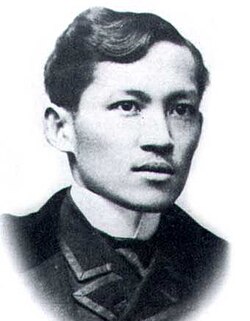A lot of us might have learned in high school that Rizal used his wit and pen to ignite the Revolution. Perhaps our high school teachers have taught us that Jose was anti-Revolutionary, going against the idea of violence to overthrow the Spanish regime. But is Rizal really against the revolution?
The answer to this question can be understood in his two novels--the Noli Me Tangere and the El Filibusterismo. The sudden shift of theme between these works proved that Rizal became tired of peacefully asking reforms to the Colonial Government.
Noli is at some point, romantic, as portrayed by the love story of Ibarra and Maria Clara. The protagonist, Ibarra, depicts a hesitant Filipino who simply asked reforms from the Spaniards rather than the use of force. But El Fili was a contradiction. Ibarra, who later became Simoun, promoted uprisings, rebellions, and revenge. The second novel, therefore, presents a more radical approach against the Spaniards.
But, El Fili ended with a failure. The plotted revenge of Simoun did not materialize. According to Graciano Lopez Jaena, Rizal left the second novel a "problem without solution." With this, we can say that Jose at that time was a "Reluctant Revolutionary"*
But was it really hesitancy? According to Leon Ma. Guerrero, one of the most famous biographer of our National Hero, this failure let the Filipinos to realize that they are not yet ready for a revolution--that anything might happen and become a hindrance for a successful uprising. And he must have been right: any revolution without prior planning will definitely result into chaos, instead of triumph.
With this, we may arrive into conclusion that Jose is not "Anti-Revolutionary," contrary to what was imposed by Renato Constantino. We can say that what Jose advocates is concrete planning and strategy for the Philippines to be fully detached from Spain's injustices.
His ideas of separation became evident when Simoun told the following to Basilio:
"You ask parity of rights, the Spanish way of life, and you do not realize that what you are asking is death, the destruction of national identity.... So they refuse to integrate you into the Spanish nation, so much the better! Take the lead in forming your own individuality, try to lay the foundations of a Filipino nation.... Instead of aspiring to be a mere province, aspire to be a nation. (Guerrero, 2010).
"Aspire to be a nation." What Jose wants is the complete separation, not just assimilation--assimilation that will lead to the "destruction of national identity." Indeed, the El Filibusterismo served as spark which paved way to the Philippine Independence.
______________________________
Notes:
* Reluctant Revolutionary is the title of Chapter XIV from Guererro's The First Filipino.
Sources:
Guerrero, L.M. (2010). The First Filipino. Manila: Guerrero Publishing.
Images:
http://upload.wikimedia.org/wikipedia/commons/thumb/b/b0/Jose_rizal_01.jpg/250px-Jose_rizal_01.jpg
http://www.kabayancentral.com/book/nhi/9715380166.jpg


Maganda ang pagkakasulat, mas mabuting pagkakaintindi sa pagkakaiba ng dalawang nobela ni Jose Rizal. Nakakadagdag ng lakas bilang isang nacionalista. Magaling, Jericho! Mabuhay!
ReplyDelete